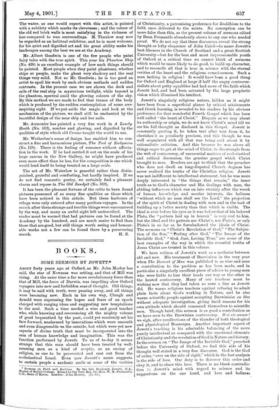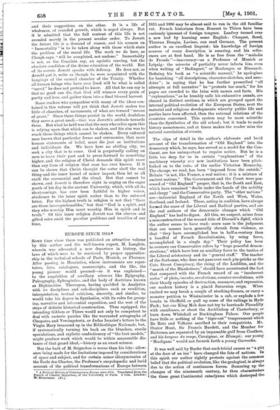BOOKS.
SOME SERMONS BY JOWETT.* ABOUT forty years ago at Oxford, as Mr. John Morley has said, the star of Newman was setting, and that of Mill was rising. At the same time a far more revolutionary force than that of Mill, the force of Darwin, was impelling slow Oxford voyagers into new and forbidden seas of thought. Old things, it may be said with truth, were passing away, and all things were becoming new. Each in his own way, Clough and Arnold were expressing the hopes and fears of an epoch charged with surging ideas and suggesting new temptations to the soul. Such a time needed a wise and good teacher who, while knowing and reverencing all the mighty volume of good bequeathed by the past, could yet resolutely set his face forward, nnalarmed by innovations which were uncouth and even disagreeable on the outside, but which were yet new aspects of divine truth that must be incorporated into the sum of human knowledge and imagination. This was the function performed by Jowett. To us of to-day it seems strange that this man should have been treated by well- meaning men as a kind of sceptic, as an enemy of religion, as one to be persecuted and cast out from the ecclesiastical Israel. Even now Jowett's name suggests to certain people a sardonic smile at some of the verities
• Sermons on Faith and Doctrine. By the late Benjamin Jowett, M.A., Master of Bellied College. Edited by the Very Bev. the Hoe. W. H. Fremantle. DAD., Dean of Einem London ; John Murray. [7s. 6d.) of Christianity. a patronising preference for Buddhism to the faith once delivered to the saints. No conception can be more false than this, as the present volume of sermons edited by Dean Fremantle abundantly shows to any one who needed proof. We do not say that these discourses reveal the strong thought or lofty eloquence of John Caird—to name Jowett's best likeness in the Church of Scotland and a great Scottish University—but for the best and most impressionable youth of Oxford at a critical time we cannot think of sermons which would be more likely to do good, to build up character, and to reconcile all that is true in science with the eternal verities of the heart and the religious consciousness. Such a man lacking in religion ! It would have been a good thing for Oxford and England at large if half the angry controver- sialists about petty squabbles had had more of the faith which Jowett had, and had been actuated by the large prophetic vision which illumined his intellect.
Jowett's singularly religious nature, hidden as it might have been from a superficial glance by critical attainments and Greek learning, is revealed to his readers by his obvious preference for that wonderful Fourth Gospel which has been well called " the heart of Christ." Dispute as we may about its authorship or origin, we do not know Christ's mind till we see his full thought as disclosed in this Gospel. Jowett is constantly quoting it, he takes text after text from it, he cherishes it as peculiarly precious, and this though he was well acquainted with all that was being said about it by rationalistic criticism. And this because he was above all things eager to get at the mind of Christ, to disentangle from the web of controversy, of unessential matters of ecclesiastical and critical discussion, the genuine gospel which Christ brought to man. Readers are apt to think that the preacher who does not dwell on long-disputed Church dogmas has never realised the truths of the Christian religion. Jowett was not indifferent to intellectual statement, but he was more deeply interested in "the things that remain," the inner truth as to God's character and His dealings with man, the abiding influences which run on into eternity after the wreck of human knowledge and secular interests, the holiness " without which no man shall see the Lord," the projection of the spirit of Christ in dealing with men and in the task of building up a better society than that which is visible. The ideal is ever before his eyes as it was before that of his beloved Plato, the "pattern laid up in heaven" is very real to him, but the ideal and the pattern are Christ's, not Plato's, or only Plato's in so far as he foreshadowed the ideals of Christ. The sermons on " Christ's Revelation of God," " The Subjec- tion of the Son," "Feeling after God," " The Image of the Invisible God," " God, Just, Loving, True," are some of the best examples of the way in which the essential truths of Jesus Christ are treated in this volume.
We have written of Jowett's work as a mediator between old and new. His treatment of Darwinism in the very year when The Descent of Man was published is as wise and sane a contribution to the problem as has been made, and in particular a singularly excellent piece of advice to young men who were liable to lose their heads one way or the other in the heated controversy. Many of our teachers must be wishing now that they had taken so sane a line as J owett did. He warns religious teachers against refusing to admit plain facts about God's working in Nature, and he also warns scientific people against accepting Darwinisim en bloc without adequate investigation, giving lucid reasons for his own attitude which should commend themselves to scientific men. Though brief, this sermon is as good a contribution as we have seen to the Darwinian controversy. 0 si sic omnes ! we sigh, after recollections of the thunder of both theological and physiological Boanerges. Another important aspect of Jowett's teaching is his admirable balancing of the more purely intellectual as compared with the emotional elements of Christianity and the revelation of God in Nature and history. In the sermon on " The Image of the Invisible God," preached before the University of Oxford, we find this aide of his thought well stated in a very fine discourse. God is the God of order, " ever on the aide of right," which in the last analysis is the side of love. Onr duty is to discover this order and obey it, and to share this love. There is no blank contradic- tion is Jowett's mind with regard to science and its suggestions on the one hand, and love and holiness and their suggestions on the other. It is a life of wholeness, of rounded growth, which is urged always. But it is admitted that the full content of this life is not revealed merely in the present secular order. To Jowett the future life is a demand of reason, and his sermon on " Immortality " is to be taken along with those which state the problem of the moral life. The work we do here, as Clough says, " will be completed, not undone." Immortality is not, as the Comtists say, an egoistic craving, but the absolute condition of the divine education of the world. But of its secrets Jowett speaks with delicacy. He does not, as Arnold put it, write as though be were acquainted with the hangings of the council chamber of the Trinity. Whether all human beings who have ever lived will be what is called "saved" he does not pretend to know. All that he can say is that no good can die, that God will winnow every grain of purity and love, and gather them into a final blessed harvest.
Some readers who sympathise with many of the ideas con- tained in this volume will yet think that Jowett makes too little of churches, of sacraments, of what are termed " means of grace." Since these things persist in the world, doubtless they serve a great need,----that was Jowett's attitude towards them. But what he held was that the man who relies upon this is relying upon that which can be shaken, and his aim was to reach those things which cannot be shaken. Every cultured man knows that particular forms and ceremonies, that mere human statements of belief, must die just as institutions and individuals die. We have here no abiding city, we seek a city that is to come. God is perpetually calling on men to leave their past and to press forward to something higher, and the religion of Christ demands this spirit more than any form of religion that man has ever known. If it can be shown that Christ thought the outer shell the real thing and the inner kernel of minor import, then let us all exalt the ceremonial and the ritual. But that cannot be shown, and Jowett is therefore right in urging on the eager youth of his day in the ancient University, which, with all its shortcomings, has ever been faithful to higher voices, obedience to the inner spirit rather than to the outward letter. For the highest truth in religion is not that " there are three incomprehensibles," but that " God is a spirit, and they who worship Him must worship Him in spirit and in truth." Of this inner religion Jowett was the sincere and gifted voice amid the peculiar problems and troubles of our time.











































 Previous page
Previous page